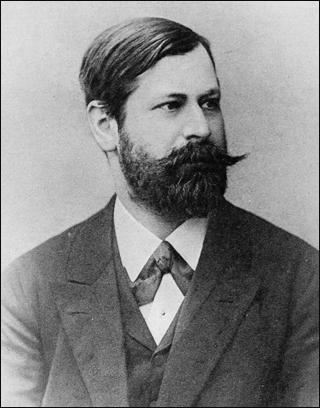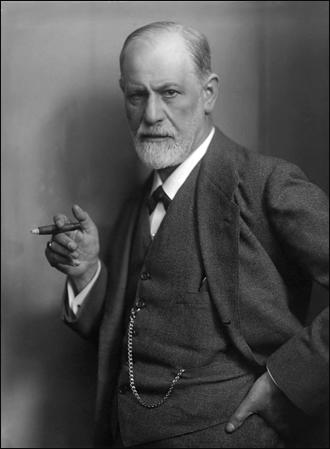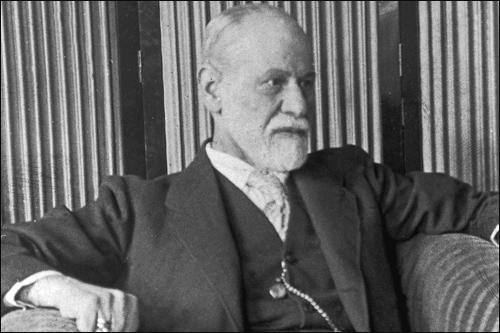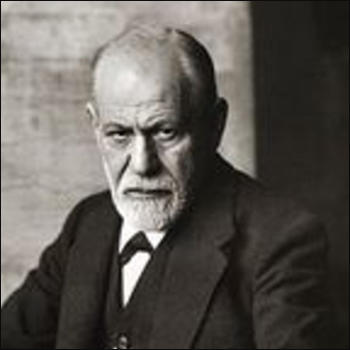Sigmund Freud Quotes
(1) "A man who has been the indisputable favourite of his mother keeps for life the feeling of a conqueror, that confidence of success that often induces real success." Sigmund Freud, letter to Ernest Jones (1917)
(2) "How wise are our elders to burden the fair sex with but little knowledge of natural science! (I see we are all agreed that women are both for something better than to acquire wisdom." Sigmund Freud, letter to Wilhelm Fliess (7th February, 1873)
(3) "Woe to you my Princess, when I come. I will kiss you quite red and feed you till you are plump. And if you are forward you shall see who is the stronger, a gentle little girl who doesn't eat enough or a big wild man who has cocaine in his body. In my last severe depression I took coca again and a small dose lifted me to the heights in a wonderful fashion. I am just now busy collecting the literature for a song of praise in this magical substance." Sigmund Freud, letter to Martha Bernays (2nd June, 1884)
(4) "A man like me cannot live without a hobby-horse, a consuming passion - in Schiller's words a tyrant. I have found my tyrant, and in his service I know no limits. My tyrant is psychology. it has always been my distant, beckoning goal and now since I have hit upon the neuroses, it has come so much the nearer." Sigmund Freud, letter to Wilhelm Fliess (1895)

(5) "I do not doubt that it would be easier for fate to take away your suffering than it would for me. But you will see for yourself that much has been gained if we succeed in turning your hysterical misery into common unhappiness." Studies on Hysteria (1895)
(6) "I am almost certain that I have solved the riddles of hysteria and obsessional neurosis with the formulas of infantile sexual shock and sexual pleasure, and I am equally certain that both neuroses are, in general, curable - not just individual symptoms but the neurotic disposition itself." Sigmund Freud, letter to Wilhelm Fliess (16th October 1895)
(7) "I have not succeeded in gaining a theoretical understanding of repression and its interplay of forces. It seems once again arguable that only later experiences give the impetus to fantasies, which then hark back to childhood, and with this the factor of a hereditary disposition regains a sphere of influence from which I had made it my task to dislodge it - in the interest of illuminating neurosis." Sigmund Freud, letter to Wilhelm Fliess (21st September, 1897)
(8) "My self-analysis is in fact the most essential thing I have at present and promises to become of the greatest value to me if it reaches its end... Being totally honest with oneself is a good exercise. A single idea of general value dawned on me. I have found, in my own case, too, the phenomenon of being in love with my mother and jealous of my father, and now I consider it an universal event in early childhood... If this is so, we can understand the gripping power of Opedius Rex... the Greek legend seizes upon a compulsion which everyone recognizes because he senses its existence within himself. Everyone in the audience was once a budding Oedipus in fantasy and each recoils in horror from the dream fulfillment here transplanted into reality, with the full quantity of repression which separates his infantile state from his present one." Sigmund Freud, letter to Wilhelm Fliess (15th October, 1897)
(9) "I do not in the least underestimate bisexuality... I expect it to provide all further enlightenment." Sigmund Freud, letter to Wilhelm Fliess (25th March 1898)
(10) "Bisexuality! You are certainly right about it. I am accustoming myself to regarding every sexual act as a process which four individuals are involved." Sigmund Freud, letter to Wilhelm Fliess (1st August, 1899)
(11) "I am actually not at all a man of science, not an observer, not an experimenter, not a thinker. I am by temperament nothing but a conquistador - an adventurer, if you want it translated - with all the curiosity, daring, and tenacity characteristic of a man of this sort." Sigmund Freud, letter to Wilhelm Fliess (1st February, 1900)
(12) "The interpretation of dreams is the royal road to a knowledge of the unconscious activities of the mind." The Interpretation of Dreams (1900)
(13) "Moreover, the act of birth is the first experience of anxiety, and thus the source and prototype of the affect of anxiety." The Interpretation of Dreams (1900)
(14) "The psychoanalysis of neurotics has taught us to recognize the intimate connection between wetting the bed and the character trait of ambition." The Interpretation of Dreams (1900)
(15) "And now, the main thing! As far as I can see, my next work will be called Human Bisexuality. It will go to the root of the problem and say the last word it may be granted to say - the last and the most profound." Sigmund Freud, letter to Wilhelm Fliess (7th August 1901)
(16) "The great question that has never been answered, and which I have not yet been able to answer, despite my thirty years of research into the feminine soul, is what does a woman want?" Dora : An Analysis of a Case of Hysteria (1905)
(17) "No one who, like me, conjures up the most evil of those half-tamed demons that inhabit the human beast, and seeks to wrestle with them, can expect to come through the struggle unscathed." Dora : An Analysis of a Case of Hysteria (1905)
(18) "A person who feels pleasure in producing pain in someone else in a sexual relationship is also capable of enjoying as pleasure any pain which he may himself derive from sexual relations. A sadist is always at the same time a masochist." Three Essays on the Theory of Sexuality (1905)
(19) "Conscience is the internal perception of the rejection of a particular wish operating within us". Totem and Taboo: Resemblances Between the Mental Lives of Savages and Neurotics (1913)
(20) "At bottom God is nothing more than an exalted father." Totem and Taboo: Resemblances Between the Mental Lives of Savages and Neurotics (1913)
(21) "Psychoanalysis... should find a place among the methods whose aim is to bring about the highest ethical and intellectual development of the individual." Sigmund Freud, letter to James Jackson Putnam (30th March, 1914)
(22) "We are and remain Jews. The others will only exploit us and will never understand and appreciate us." Sigmund Freud, letter to Sabina Spielrein (29th September 1913)
(23) "The common characteristic of all perversions... is that they have abandoned reproduction as their aim. We term sexual activity perverse when it has renounced the aim of reproduction and follows the pursuit of pleasure as an independent goal. And so you realize that the turning point in the development of sexual life lies in its subjugation to the purpose of reproduction. Everything this side of the turning point, everything that has given up this purpose and serves the pursuit of pleasure alone, must carry the term 'perverse' and as such be regarded with contempt." A General Introduction to Psychoanalysis (1920)
(24) "Cruelty and intolerance to those who do not belong to it are natural to every religion." Group Psychology and the Analysis of the Ego (1921)

(25) "The ego represents what we call reason and sanity, in contrast to the id which contains the passions." The Ego and the Id (1923)
(26) "The sexual wishes in regard to the mother become more intense and the father is perceived as an obstacle to the; this gives rise to the Oedipus complex." The Ego and the Id (1923)
(27) " We obtain our concept of the unconscious, therefore, from the theory of repression … We see, however that we have two kinds of unconscious — that which is latent but capable of becoming conscious, and that which is repressed and not capable of becoming conscious in the ordinary way." The Ego and the Id (1923)
(28) "The poets and philosophers before me discovered the unconscious; what I discovered was the scientific method by which the unconscious can be studied." Sigmund Freud, letter to Lionel Trilling (1926)
(29) "The voice of the intellect is a soft one, but it does not rest until it has gained a hearing. Ultimately, after endlessly repeated rebuffs, it succeeds. This is one of the few points in which it may be optimistic about the future of mankind, but in itself it signifies not a little." The Future of an Illusion (1927)
(30) "Religious ideas have sprung from the same need as all the other achievements of culture: from the necessity for defending itself against the crushing supremacy of nature." The Future of an Illusion (1927)
(31) "Religious doctrines… are all illusions, they do not admit of proof, and no one can be compelled to consider them as true or to believe in them." The Future of an Illusion (1927)

(32) "Immorality, no less than morality, has at all times found support in religion." The Future of an Illusion (1927)
(33) "The true believer is in a high degree protected against the danger of certain neurotic afflictions, by accepting the universal neurosis he is spared the task of forming a personal neurosis." The Future of an Illusion (1927)
(34) "Religion is a system of wishful illusions together with a disavowal of reality, such as we find nowhere else but in a state of blissful hallucinatory confusion. Religion's eleventh commandment is 'Thou shalt not question.' But man's helplessness remains and along with it his longing for his father, and the gods. The gods retain their threefold task: they must exorcise the terrors of nature, they must reconcile men to the cruelty of Fate, particularly as it is shown in death, and they must compensate them for the sufferings and privations which a civilized life in common has imposed on them." The Future of an Illusion (1927)
(35) "It is impossible to escape the impression that people commonly use false standards of measurement — that they seek power, success and wealth for themselves and admire them in others, and that they underestimate what is of true value in life." Civilization and Its Discontents (1929)
(36) "What we call happiness in the strictest sense comes from the (preferably sudden) satisfaction of needs which have been dammed up to a high degree". Civilization and Its Discontents (1929)
(37) "We are never so defenceless against suffering as when we love, never so helplessly unhappy as when we have lost our loved object or its love". Civilization and Its Discontents (1929)
(38) "Life as we find it is too hard for us; it entails too much pain, too many disappointments, impossible tasks. We cannot do without palliative remedies." Civilization and Its Discontents (1929)
(39) "I cannot inquire into whether the abolition of private property is expedient or advantageous. But I am able to recognize that the psychological premises on which the system is based are an untenable illusion. In abolishing private property we deprive the human love of aggression of one of its instruments, certainly a strong one, though certainly not the strongest, but we have not altered the differences in power and influence which are misused by aggressiveness, nor have we altered anything in its nature. Aggressiveness was not created by property. It reigned almost without limit in primitive times, when property was still very scanty, and it already shows itself in the nursery almost before property has given up its primal, anal form; it forms the basis of every relation of affection and love among people (with the single exception, perhaps, of the mother's relations to her male child)." Civilization and Its Discontents (1929)

(40) "Religion is an illusion and it derives its strength from the fact that it falls in with our instinctual desires." New Introductory Lectures on Psychoanalysis (1932)
(41) "What progress we are making. In the Middle Ages they would have burned me. Now they are content with burning my books." Sigmund Freud, letter to Ernest Jones (August, 1933)
(42) “Homosexuality is assuredly no advantage, but it is nothing to be ashamed of, no vice, no degradation, it cannot be classified as an illness; we consider it to be a variation of the sexual function produced by a certain arrest of sexual development. Many highly respectable individuals of ancient and modern times have been homosexuals, several of the greatest among them (Plato, Michelangelo, Leonardo da Vinci). It is a great injustice to persecute homosexuality as a crime, and cruelty too." Sigmund Freud, letter to a mother who had been complaining about her son's homosexuality (9th April 1935)
